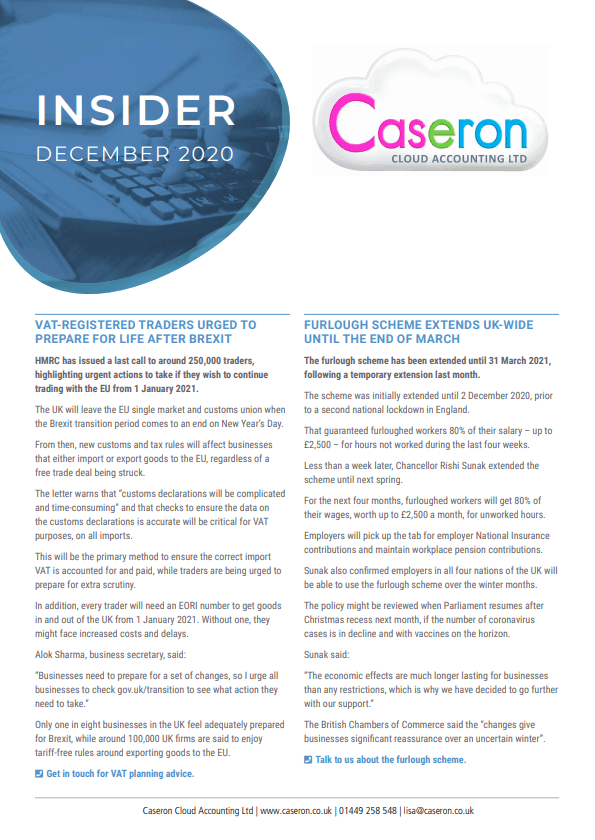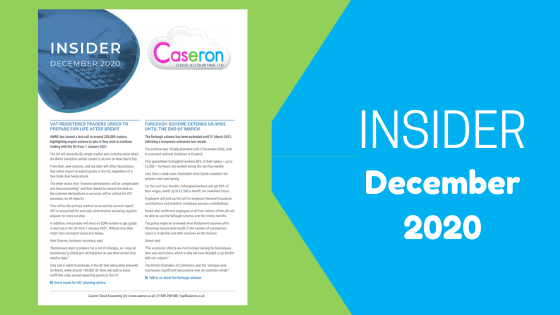Highlights

- VAT-registered traders urged to prepare for life after Brexit
- Furlough scheme extends UK-wide until the end of March 2021
- Government body urges capital gains tax overhaul
- Self-employe fear tax returns may affect fourth SEISS claim
Insights
VAT-registered traders urged to prepare for life after Brexit
HMRC has issued a last call to around 250,000 traders, highlighting urgent actions to take if they wish to continue trading with the EU from 1 January 2021.
The UK will leave the EU single market and customs union when the Brexit transition period comes to an end on New Year’s Day.
From then, new customs and tax rules will affect businesses that either import or export goods to the EU, regardless of a free trade deal being struck.
The letter warns that “customs declarations will be complicated and time-consuming” and that checks to ensure the data on the customs declarations is accurate will be critical for VAT purposes, on all imports.
This will be the primary method to ensure the correct import VAT is accounted for and paid, while traders are being urged to prepare for extra scrutiny.
In addition, every trader will need an EORI number to get goods in and out of the UK from 1 January 2021. Without one, they might face increased costs and delays.
Alok Sharma, business secretary, said:
“Businesses need to prepare for a set of changes, so I urge all businesses to check gov.uk/transition to see what action they need to take.”
Only one in eight businesses in the UK feel adequately prepared for Brexit, while around 100,000 UK firms are said to enjoy tariff-free rules around exporting goods to the EU.
Get in touch for VAT planning advice.
Furlough scheme extends UK-wide until the end of March
The furlough scheme has been extended until 31 March 2021, following a temporary extension last month.
The scheme was initially extended until 2 December 2020, prior to a second national lockdown in England.
That guaranteed furloughed workers 80% of their salary – up to £2,500 – for hours not worked during the last four weeks.
Less than a week later, Chancellor Rishi Sunak extended the scheme until next spring.
For the next four months, furloughed workers will get 80% of their wages, worth up to £2,500 a month, for unworked hours.
Employers will pick up the tab for employer National Insurance contributions and maintain workplace pension contributions.
Sunak also confirmed employers in all four nations of the UK will be able to use the furlough scheme over the winter months.
The policy might be reviewed when Parliament resumes after Christmas recess next month, if the number of coronavirus cases is in decline and with vaccines on the horizon.
Sunak said:
“The economic effects are much longer lasting for businesses than any restrictions, which is why we have decided to go further with our support.”
The British Chambers of Commerce said the “changes give businesses significant reassurance over an uncertain winter”.
Talk to us about the furlough scheme.
Government body urges capital gains tax overhaul
Current capital gains tax rates are too complex and should be aligned with income tax rates, according to the Office for Tax Simplification (OTS).
Capital gains tax in the UK is charged at 10% and 20% for most taxable assets, or 18% and 28% for residential property that is not a main home.
Income tax in England, Northern Ireland and Wales is charged at rates of 20%, 40% and 45%, with different rates and bands applying in Scotland.
The OTS said harmonising capital gains tax rates with income tax rates could raise an extra £14 billion a year for the Treasury, equating to £70bn over five years.
Should the Treasury more closely align the two taxes, wealthy people who own second homes or assets not held in tax-free wrappers would pick up most of the bill.
In July 2020, Chancellor Rishi Sunak commissioned the OTS to recommend ways to simplify the levy and the first of two reports was published last month.
Other proposals include slashing the £12,300 annual capital gains tax-free allowance and replacing it so that it only covers asset price increases that are equivalent to inflation.
The OTS said lowering this allowance to £5,000 would double the amount of people who pay capital gains tax, while reducing it to £1,000 would almost triple the number.
Should the annual allowance be lowered, many more people would have to file annual tax returns through self-assessment.
More than 275,000 people paid a total of £9.5bn in capital gains tax in 2018/19.
Of that, 40% came from wealthy individuals who made gains of £5 million or more. By contrast, more than 31m people pay income tax, raising close to £200bn a year.
Sunak does not have to accept the report’s findings, but the Chancellor is looking for ways to recoup some of the £210bn spent on COVID-19 support.
Speak to us about capital gains tax.
Self-employed fear tax returns may affect fourth SEISS claim
Some self-employed workers fear submitting their 2019/20 tax return early might affect their ability to claim a fourth taxable grant from the Government.
The deadline to submit tax returns for 2019/20 through self-assessment is on or before midnight on 31 January 2021, with around 10.7 million returns sent in last year.
Last month, an extension to the self-employed income support scheme (SEISS) was announced, offering two further payouts covering the three months from 1 November 2020 to 31 January 2021 and 1 February 2021 to 30 April 2021.
Applications for the third taxable grant opened for existing claimants on 30 November 2020, although the Treasury has yet to publish details on the fourth taxable grant.
The first taxable grant, which covered 1 March 2020 to 31 May 2020, was offered to self-employed workers who were either forced to close or saw their business negatively affected by COVID-19.
As this covered the final five weeks of the 2019/20 tax year, which ended on 5 April 2020, and the payout was based on profits of up to £50,000 from 2018/19, some self-employed people fear submitting a tax return early will negatively affect their claim for the fourth grant.
HMRC has not confirmed if it will use updated figures from 2019/20 or remain using historical data, but the assumption is that the fourth claim will be based on the existing criteria.
Submitting 2019/20 tax returns early should, therefore, not impact on entitlement to the fourth taxable grant and they should be submitted as early as possible.
As SEISS grants are taxable and subject to class 4 National Insurance contributions, they mostly need to be included in 2020/21 self-assessment tax returns.
How they are reported will depend on whether the cash basis or accruals basis is used, and the accounting year-end. In some cases, the grants might need to be apportioned between 2019/20 and 2020/21.
Contact us about your tax return.





